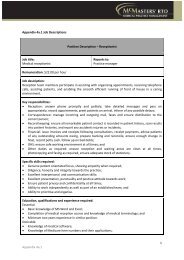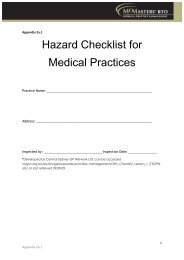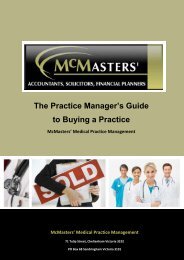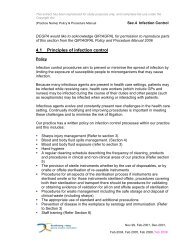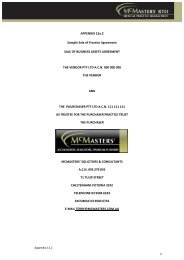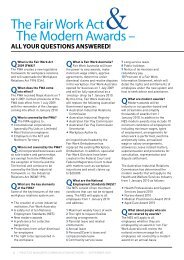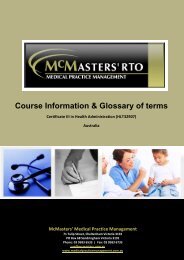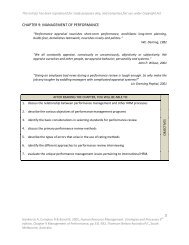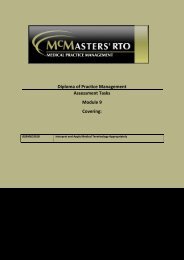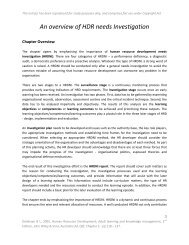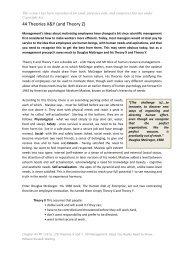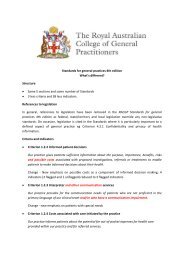The Practice Manager's Guide to Time Management
The Practice Manager's Guide to Time Management
The Practice Manager's Guide to Time Management
Create successful ePaper yourself
Turn your PDF publications into a flip-book with our unique Google optimized e-Paper software.
for receptivity. It is important <strong>to</strong> ask questions and invite feedback <strong>to</strong> gauge understanding. Clearlyand succinctly explaining instructions initially saves time in the long term.For matters of clinic policy, consider a memorandum on the <strong>to</strong>pic and give it <strong>to</strong> everyone involved.Think about amending the practice manual so there is a permanent note on the matter, <strong>to</strong>encourage retention of information and for future reference when training new staff. Considerreferring the question <strong>to</strong> someone else “John can show you how <strong>to</strong> do that”, therefore, staff traineach other and the onus is not left <strong>to</strong> one person.Delegation of management tasksResponsible for treating patients, doc<strong>to</strong>rs should be doing very little in regards <strong>to</strong> managing thepractice. Each practice should have a practice manager, who deals with all other managerial andadministrative issues of the practice. All employees of the practice should be focused on assistingthe doc<strong>to</strong>r with providing efficient service <strong>to</strong> patients, as this the focus of the practice, and withoutwhich the practice would not exist as a viable business.Some practitioners hold the view that unless it is done their way, it is done the wrong way.This is a very self-limiting view of the world. By undertaking <strong>to</strong> do everything oneself, it is unlikelythat much will be achieved, or at least not as much as if the art of delegation had been mastered.Delegation is an art, and an essential feature of all good practices. <strong>The</strong> most effective concept is <strong>to</strong>employ qualified staff, train and induct them thoroughly, and <strong>to</strong> empower them <strong>to</strong> undertake theirroles. Comprehensive position descriptions and clearly outlining responsibilities are very important.Communication is also important <strong>to</strong> ensure all team members are aware of the “big picture”, ormission of the organisation, and the part they play in it.Doc<strong>to</strong>rs’ time is a scarce commodity, and it makes sense <strong>to</strong> ration it. Delegating all appropriate tasks<strong>to</strong> responsible people, and concentrating on patient service delivery, is the key <strong>to</strong> running asuccessful practice and getting home before dinner each night.Many doc<strong>to</strong>rs find delegating tasks a challenge. If a task taking three hours is delegated from apractitioner <strong>to</strong> a staff member, the practitioner is able <strong>to</strong> see fifteen more patients. This may add,say, $300 <strong>to</strong> the week’s profit (remember, the incremental patient does not add <strong>to</strong> fixed costs, sothe extra fees are almost all profit). This means the staff member undertaking the particular task hasmeant $300 in extra profit for the practice. If the staff member did not undertake the task, practiceprofits would be $300 less. <strong>The</strong>refore, the extra profit can be attributed <strong>to</strong> the staff member.This outcome is the essence of delegation: free up the practitioner’s time so the practitioner canearn profits. “Support staff” is a very accurate term. Staff should support doc<strong>to</strong>rs by takingresponsibility for non-medical tasks, and allowing them <strong>to</strong> concentrate on treating patients. Whenmore patients are seen, the practice will improve its reputation (from a patient accessibility point ofview), and profits will commensurately increase.9



